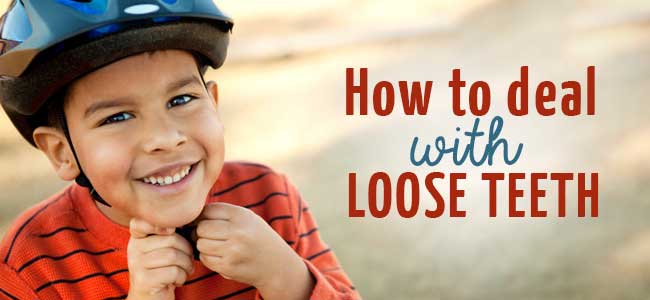
My Kid’s Tooth Is Loose — What’s Next?
Being a parent is one of the most stressful tasks in a person’s life. Once you master one stage of your child’s life, they move on to the next stage with a whole new set of problems to figure out. Case in point: their mouth. You spend years ensuring their teeth come in healthy and clean, only for them to start to fall out. As much as we love to hear the types of methods used to remove loose baby (also called primary) teeth, there are issues that can arise from this type of removal.
How Do I Know When a Tooth Is Ready to Be Pulled?
A loose tooth can cause your child pain and discomfort. You may have the urge to pull it out, but there are a few reasons why that might not be the best idea.
- Be cautious of which teeth are loose first. The first teeth that come in are usually the first teeth to come out (the front teeth should normally become loose before the back teeth). A loose tooth could be caused by damage to that tooth — for instance, from a nasty fall. If you have concern that a tooth is loose due to something other than natural causes, contact your dentist for an examination.
- Primary teeth help guide in adult teeth. If a tooth is pulled prematurely, this can affect the placement of one’s adult tooth.
- Be aware of your child’s discomfort. If the tooth isn’t ready to come out yet, it will most likely still be connected to nerves, causing pain. Another indicator the tooth isn’t ready to come out yet is if there is a lot of blood when it’s pulled.
You Won’t Let Me Tie Their Loose Tooth to a Drone – What Should I Do Instead?
To keep things natural, a good rule of thumb is to do what cavemen did. They didn’t have doors and automobiles to attach their loose teeth to, did they? If your child indicates they have a loose tooth, be sure to monitor it. Some kids may become anxious thinking about their teeth falling out. If this is the case, be reassuring and encouraging throughout the process. Beyond that, they will do all of the work. Once they find out they have a loose tooth, they will wiggle it with their tongue or fingers, leading to it falling out in a less intrusive way. If the tooth seems fairly loose and you want to help out, use a piece of gauze and gently pull the tooth while doing a wiggling motion. You shouldn’t have to use much force at all, so if doesn’t come out with a gentle pull, it probably isn’t ready yet.
There are general guidelines of when teeth are expected to become loose and fall out, but every child will be different. If you are concerned with how long your child’s baby teeth have remained in their mouth, a dentist can determine if any of them need to be pulled, while considering the health of their future adult teeth.
Tips for Giving Your Child Healthy Adult Teeth
There may be a train of thought that since baby teeth fall out, there isn’t as much of a need to care for them as compared to adult teeth. This could not be further from the truth. Taking care of children’s teeth (and gums) sets them up for a lifetime of healthy teeth. While baby teeth do eventually fall out, they will have them for around 10 to 12 years. Not only will this set them up successfully for the future, but kids need a healthy mouth to enjoy the first part of their life as well.
- Brush their teeth after every meal. The ADA has great advice on how to brush kids’ teeth.
- When a tooth starts to become loose, be sure to floss underneath it as well. Food can get caught in any crevice and will become a buffet for cavity-causing bacteria.
- Watch for certain behaviors from your child like thumb sucking and tongue thrusting.
At Douglas B. Weber, DDS, we understand the importance of the role children’s teeth play in their health. Request an appointment online with your Lancaster, CA dentist for a consultation today.
More
By admin
30 Nov, 2015
Dental Discomfort, Dental Tips, General Dentistry, Lifestyle, Preventive Dental Care
bruxism, clenching teeth, face pain, grinding teeth, grinding teeth due to stress, headache, jaw pain, mouth guards, tmj causes

Protect Your Teeth From Holiday Stress: Avoid the Seasonal Grind
The holiday season is a time of year that comes with many things: visits from loved ones, weekly parties, a multitude of shopping trips, long hours spent in the kitchen, and stress-induced bruxism. Stress isn’t always a bad thing; in fact it can even be good in small doses. It can spur excitement, joy, and eager anticipation, and it can even function as that extra bit of motivation that you need to get everything on your to-do list done. Even when the outcome of the stress you are experiencing is positive, the effects it has on you physically can be negative.
What Is Bruxism?
The gradual onset of mild to moderate head and neck aches, jaw pain, and sensitive teeth can signal that stress is beginning to take a toll and that you might be suffering from a condition called bruxism. Bruxism is a condition in which you clench and grind your teeth throughout the day and night. The clenching and grinding can become so hard and loud that it can be heard by partners and loved ones within the affected individual’s living space.
Some individuals only suffer from short bouts of bruxism. But if you begin to experience any of the following associated symptoms with regularity, you should call and set up an appointment with our provider immediately.
Signs and symptoms that indicate you could be suffering from bruxism include:
- Worn tooth enamel
- Face pain rooted at the jawline
- Earache-like pain
- Headache in the temple area
- Sores from chewing or biting the inside of your cheek
- Grinding teeth during sleeping hours
If left untreated, bruxism can lead to more serious conditions that may require extensive and expensive care to resolve. These conditions include:
Damaged teeth: Individuals who suffer from bruxism end up clenching and unclenching their teeth all throughout the night. The pressure they put on their jaws can equate to 250 pounds or more worth of force, which can cause extreme wear and tear on teeth. Tooth sensitivity is the least of the repercussions this type of pressure can have on oral health. Chipped, cracked, and severely worn teeth can result, requiring extensive restorative treatments.
TMJ: TMJ is disorder of the temporomandibular joints that causes pain in the jaw, head, and neck areas. It can cause the jaw muscles to spasm and make it difficult for sufferers to open and close their mouths normally. Treatments may include Botox injections, medications that relax muscles, and protective nighttime mouth guards.
Sleep disturbances: Bruxism ranks as the third most frequent abnormal sleep behavior. Some suffers become aware of their condition after seeking out help for severe sleep deprivation and exhaustion. They have no idea that they have been grinding their teeth at night, nor that it is the cause of their daytime drowsiness.
Who’s at Risk?
Risk factors that increase your likelihood of suffering from bruxism include:
- Age: Bruxism is most common in children but can extend into adulthood.
- Stress level: If you have a high level of stress or an increase in anxiety, you may begin to experience the signs of bruxism.
- Substance intake: Smoking tobacco, drinking caffeinated and alcoholic beverages, or taking medications that have stimulants in them may increase the risk of bruxism.
Diagnosing Bruxism
If your dentist suspects that you have bruxism, he or she will perform an exam and evaluate you for the following:
- Damage to your teeth, the bone that supports them, and the soft tissues inside your mouth
- Pain and tenderness in the jaw and mouth area
- Common dental abnormalities that are often indicators, like broken, worn-down, or missing teeth and poor tooth alignment
If you have signs of bruxism, our dentist may choose to look for changes that may have taken place over the course of your visits. Your exam may include x-rays and questionnaires.
Treatments
In the case of children affected by bruxism, treatment is rare. The majority of children age out of bruxism. Adults who grind their teeth enough to cause damage and inflict pain have treatment options that include dental protection devices, such as mouth guards and splints, and corrective dental treatment plans designed to align teeth properly. Realigning teeth may require braces and, in severe cases, oral surgery.
If stress is at the root of a patient’s bruxism condition, our dentist will refer them to a therapist that specializes in stress management and behavior therapy. In some cases, medications such as muscle relaxants may also be prescribed.
The holiday season is a time of year to be enjoyed. You don’t have to let the excitement and anticipation take an unpleasant toll. If you are experiencing any of the symptoms that may indicate you are suffering from bruxism, call Dr. Douglas Weber at (661) 952-7865 to schedule an appointment today.
More
By admin
11 Nov, 2015
Dental Discomfort, Dental Tips, General Dentistry, Lifestyle, Preventive Dental Care
brushing, enamel, fluoride, gum disease, sensitive teeth, teeth grinding, teeth whitening, tooth decay, tooth sensitivity

A breath of crisp winter air, a sip of hot cocoa, a bite out of a sweet candy cane — all of these have two things in common: They remind us of the rapidly approaching holiday season, and though less pleasant, each can also trigger the sharp, unexpected pain associated with tooth sensitivity.
What Is Tooth Sensitivity?
Tooth sensitivity is experienced as a sharp, sudden pain that is felt in the tooth and gum areas. It occurs when gum and enamel loss expose the sensitive surface of the teeth that lie beneath, called dentin. Dentin is less dense than enamel and contains thousands of tubes that lead to the tooth’s nerve center, called the pulp. Once the protective cover is lost, heat, cold, and sweet and acidic foods can reach the nerves inside the tooth through the tubes, eliciting a pain response. Fortunately, once the cause of tooth sensitivity is identified, there are options for treating it and restoring optimal oral comfort.
Causes of Tooth Sensitivity
Some of the things that lead to tooth sensitivity include:
- Overbrushing, brushing too hard, or brushing with a hard-bristle toothbrush
- Grinding and clenching teeth
- Tooth decay located near the gumline
- Plaque buildup
- Tooth-whitening products
- Gum disease
- Fractured tooth
- Dental work
Preventing Tooth Sensitivity
The key to preventing tooth sensitivity is maintaining good oral-hygiene practices. Brushing twice a day, flossing once a day, and rinsing regularly will go a long way toward keeping your gums and teeth healthy and strong. The following are additional steps you can take for reducing tooth sensitivity:
- Always use a soft-bristled toothbrush and brush gently
- Avoid foods and beverages that are acidic
- If you grind your teeth, talk to your dentist about getting a mouth guard to wear when you sleep
- Brush with toothpaste for sensitive teeth
- Keep your enamel strong by using products with fluoride
Treating Tooth Sensitivity
The manner in which tooth sensitivity is treated largely depends on the condition that led to it or the situation that is causing it. If sensitivity is resulting from a cavity or a chip in a tooth, a restoration can be placed to fix it. However, if sensitivity results from exposed dentin, there are treatments designed to reduce the discomfort.
- Fluoride varnish can be applied to the vulnerable, exposed areas of your teeth.
- A mouth tray with a high concentration of fluoride in the form of foam can be placed in your mouth for five minutes. This treatment strengthens weak areas.
- The bonding agent used to adhere restorations to teeth can be used to put a protective seal over the surface of the dentin.
- Gum tissue can be moved from one area of the mouth to an area where tissue has been lost from the root with a gum graft.
If you think you might be suffering from gum sensitivity, call us today at (661) 952-7865 to set up an appointment and find out more about what you can do to restore your oral comfort before the holidays hit.
More
If you are currently undergoing chemotherapy, we know that you are already in extreme discomfort. What patients may not realize is how these strong drugs can effect the area of concern as well as the rest of your body, including the mouth area. Chemotherapy drugs kill cancer cells, but also affect normal cells, including cells in the mouth. Healthy cells can generally repair the damage caused by the chemotherapy however, some side effects can still exist. The problems depend on the chemotherapy drugs and how your body reacts to them. You may have these problems only during treatment or for a short time after treatment ends.
It’s important to know that side effects in the mouth can be serious.
- The side effects can hurt and make it hard to eat, talk, and swallow.
- You are more likely to get an infection, which can be dangerous when you are receiving cancer treatment.
- If the side effects are bad, you may not be able to keep up with your cancer treatment. Your Physician may need to cut back on your cancer treatment or may even stop it.
What mouth problems does chemotherapy cause?
- Soreness and ulceration of the mouth
- Mouth infections
- Dry mouth
- Bleeding gums
- Burning, peeling, or swelling tongue
- Change in taste
Why Should I See Dr. Weber?
Schedule an appointment with Dr. Weber in Lancaster, CA before chemotherapy begins to inorder to help prevent potentially serious mouth problems. Dr. Weber can help you get your teeth and gums into the healthiest possible condition before your treatment begins.
During your chemotherapy treatment you may experience dry mouth therefore there will be less saliva to protect the teeth. Fluoride toothpaste or a fluoride mouthwash during your chemotherapy will help protect your teeth and can be prescribed by Dr. Weber.
Discuss with your oncologist any dental work that needs to be done during your chemotherapy treatment. There will be times during your chemotherapy when you will be at more risk of bleeding and infection, and the timing of any dental work needs to be planned very carefully. Speak with your oncologist about ideal timing for dental procedures. Dr. Weber would be happy to help you communicate with your physician as well. Schedule an appointment with Dr. Weber as soon as you can before chemotherapy treatments begin or at any time during your treatments if you are experiencing discomfort.
What Will the Lancaster, CA Dental Team at Douglas B. Weber, D.D.S. Do?
- Check and clean your teeth
- Take x-rays
- Take care of mouth problems
- Show you how to take care of your mouth to prevent side effects
Additional Resources:
http://www.macmillan.org.uk/Cancerinformation/Livingwithandaftercancer/Symptomssideeffects/Mouthcare/Chemotherapy.aspx
More
 Anytime you have a toothache, the first thing most people do is seek an over-the-counter (OTC) pain reliever. While this may provide some temporary relief, to discover the cause of your toothache and the right treatment, you will need to see a dentist. Dr. Weber in Lancaster, CA will determine the exact cause of your pain in order to prescribe the best treatment plan for you. Dr. Weber will determine if the problem is due to decay or trauma to a tooth involving the central pulp tissue containing the nerve which is the most common cause for severe toothaches. This will require endodontic (“endo” = inside, “dont” = tooth) treatment or what is commonly referred to as a root canal treatment, which will remove the pain and allow you to keep the tooth.
Anytime you have a toothache, the first thing most people do is seek an over-the-counter (OTC) pain reliever. While this may provide some temporary relief, to discover the cause of your toothache and the right treatment, you will need to see a dentist. Dr. Weber in Lancaster, CA will determine the exact cause of your pain in order to prescribe the best treatment plan for you. Dr. Weber will determine if the problem is due to decay or trauma to a tooth involving the central pulp tissue containing the nerve which is the most common cause for severe toothaches. This will require endodontic (“endo” = inside, “dont” = tooth) treatment or what is commonly referred to as a root canal treatment, which will remove the pain and allow you to keep the tooth.
Just make sure you don’t let a toothache go untreated too long, you want to pinpoint the problem before it gets worse. If you are unsure of what you are feeling, contact the dental team at Douglas B. Weber D.D.S. in Lancaster, CA as soon as possible so you can get back to enjoy a pain-free life.
More




